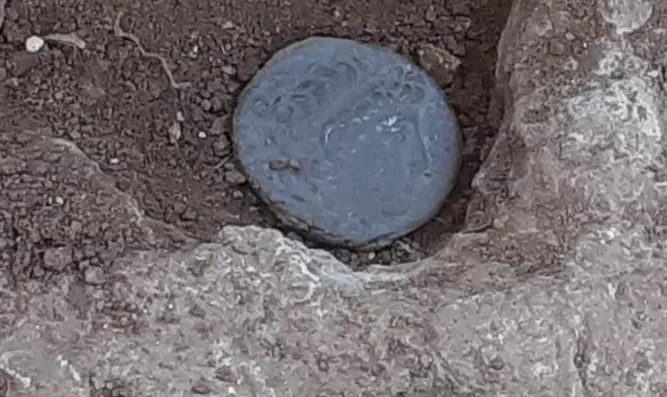by Arutz Sheva Staff
Hundreds of youths participate in archaeological dig at Tel Khaya site in Itamar, discover various finds from the Hasmonean period.
 |
| one of the coins found in Itamar DR. Dvir Raviv |
Hundreds of teenagers participated in a week of archaeological excavations and conservation work at the Tel Khaya site in the locality of Itamar in Samaria. Archaeological finds such as coins and other tools were found during the excavations. The excavation week was organized by the Emunim movement.
The excavations at the site are led by Dr. Dvir Raviv of the Bar Ilan Institute of Archeology, in collaboration with the Zeev K. Adler Guard, with the participation of students from the Department of the Land of Israel Studies and Archeology at Bar Ilan University and the Department of the Land of Israel Studies at Herzog College.
Samaria Regional Council chairman Yossi Dagan arrived at the site, met with the residents of the site, and received an overview of the excavations and finds. Dagan told the youth about the history of the place, from the time of the Biblical Patriarch Abraham, the Hasmonean period and the entire history of the area.
"Jews lived here, the findings you found here testify to our deep roots in the area," Dagan said. "In front of you you can see the PLO flag over Tel Aroma, a place from the time of Avimelech ben Gideon the Judge, where there was also a huge fortress in the Hasmonean period, and it is possible that this place was the village next to the fortress, or the city the fortress protected during the Second Temple period."
"If you look behind you, you can see the yeshiva in Itamar, next to it the yeshiva high school, above them the ridge of the hills and behind us the old settlement of Itamar. There is no other nation that gets to come after 2000 years, discover its deepest roots and build its future out of them," Dagan added.
Items from the Hellenistic and Hasmonean periods were found on the tell, including coins, cooking pots, a cloth house, a mikveh and other magnificent buildings. The archaeologist who heads the excavation team, Dvir Raviv, said, "We took another important step in understanding the history of the site and preserving its remains."
The arrival of the boys to volunteer at the excavation site was organized by the Emunim movement in cooperation with the Samaria Regional Council and the Council's Tourism Department. The chairman of the Emunim movement, Zvi Sukkot, said, "It is very exciting to see hundreds of youth from all over the country actively participate in the study of Samaria, tracing the earliest roots of the Jewish people."
Arutz Sheva Staff
Source: https://www.israelnationalnews.com/News/News.aspx/315757
No comments:
Post a Comment